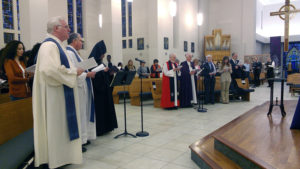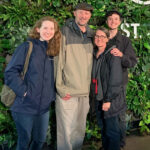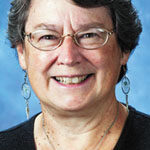By Barb Arland-Fye
The Catholic Messenger
DAVENPORT — Christians, Jews and Muslims participated in a solemn prayer service March 24 at St. Ambrose University to commemorate the 100th anniversary of the Armenian genocide. It was one of several events in the Quad Cities to ensure that the memory of the 1.5 million victims is not forgotten.

Faith leaders participate in an interfaith prayer service March 24 at St. Ambrose University, Davenport, commemorating the 100th anniversary of the Armenian genocide. From left: Father Conn O’Maoldhomhnaigh, Father Charles Adam, Very Rev. Father Aren Jebejian, retired Episcopal Bishop Christopher Epting, Bishop Martin Amos, Lisa Killinger and Rabbi Tamar Grimm.
“In 1928 when Adolf Hitler was trying to justify his plan for the ethnic cleansing that led to the Holocaust, he is said to have remarked, ‘Who nowadays still talks about the Armenians?’ Tonight all of us here can clearly say, ‘We do,’” said St. Ambrose University Provost Paul Koch in his welcome to prayer service participants in Christ the King Chapel.
“We are here to remember, to proclaim the message of the importance of respecting human life, of the value of human diversity,” Koch said. These are “all things that we treasure here at St. Ambrose as a Catholic university and especially fitting during this, our celebration of Multicultural Week.”
Among the prayer service participants was Arthur Tatoian of Bettendorf, whose two oldest brothers were victims of the genocide. “I’ve never seen a picture of them. They got massacred in Armenia,” Tatoian, 84, said. His parents managed to flee from Armenia, but without their young sons. They named two sons born later — Ardash (Arthur) and Murad (Steve) — after the sons who perished. “That way they could still remember them,” Arthur Tatoian said.
The systematic killing of Armenians occurred from 1915-23. Many were executed or massacred; others died of starvation, disease or torture on orders of the Ottoman Empire
Turks, according to news sources. Present-day Republic of Armenia is bordered by Turkey to its west, Azerbaijan to its east and Iran to the south. Over its history, Armenia had been part of the Ottoman Empire and lived in relative harmony. But, as the Ottoman leadership became more radical at the turn of the 20th century, the Christian Armenians faced years of discrimination.
“We want to look at not just the Holocaust but also at other genocides and try to educate people, especially kids, about what’s going on in today’s world,” said Allan Ross. He’s executive director of the Jewish Federation of the Quad Cities and a member of the Armenian Genocide Remembrance Committee of the Quad Cities, an offshoot of the Holocaust Education Committee.
In his homily, Bishop Martin Amos remembered those throughout history who lost their lives because of their faith or ethnicity, from Christian martyrs of the first centuries to Christians, Jews and Muslims in the 21st century.
Speaking from his Catholic faith tradition, the bishop observed that “When we remember in liturgy the passion, death and resurrection of Jesus, the events are made present to us and we are invited to participate in those saving events.
“So as we remember this evening those Armenians who died, they are made present for us as well. The body of Christ suffers and as part of the body of Christ, we in turn suffer that such things could happen, did happen, do happen.” In the midst of sorrow, “We are called to be a beacon of hope, a light in the darkness, a people of resurrection,” the bishop said. He quoted St. John Paul II about the need to foster peace, first of all, in one’s heart. “Gestures of peace create a tradition and a culture of peace.”
Peace is a gift from God, the bishop observed, but recipients must be open receiving it. “Yes, we remember and pray for those who suffered and died so unjustly, but we also commit ourselves to peace.”
The Very Rev. Father Aren Jebejian, who led the prayer service, noted that Turkey denies the Armenian genocide. Efforts nearly five years ago to establish protocols for opening borders between Turkey and Armenia, which is now an independent democracy, didn’t move forward. “We’re neighbors. We have to live in peace … it’s been 100 years. It’s time to forgive,” said Rev. Jebejian, pastor of St. Gregory the Illuminator Armenian Church, Chicago. “It’s not just the Armenian genocide we have to consider. It is man’s inhumanity to man.” Genocide must stop, and the effort to do so “has to start with us.”
Prayer service participants
Faith leaders who participated in the interfaith prayer service March 24 in Davenport were Bishop Martin Amos of the Davenport Diocese; the Very Rev. Father Aren Jebejian of St. Gregory the Illuminator Armenian Church, Chicago; Father Charles Adam and Father Conn O’Maoldhomhnaigh of St. Ambrose University, Davenport; Rabbi Tamar Grimm of Tri-City Jewish Center, Rock Island, Ill.; Lisa Killinger of the Islamic Center of the Quad Cities; and retired Episcopal Bishop Christopher Epting, Davenport.
Pope to commemorate genocide anniversary
Pope Francis will celebrate a Mass commemorating the 100th anniversary of the Armenian genocide on April 12. In February, he declared a 10th-century Armenian monk, St. Gregory of Narek, a doctor of the church. The Vatican also plans to release thousands of documents pertaining to the Armenian genocide from its archives, according to Catholic News Service.











